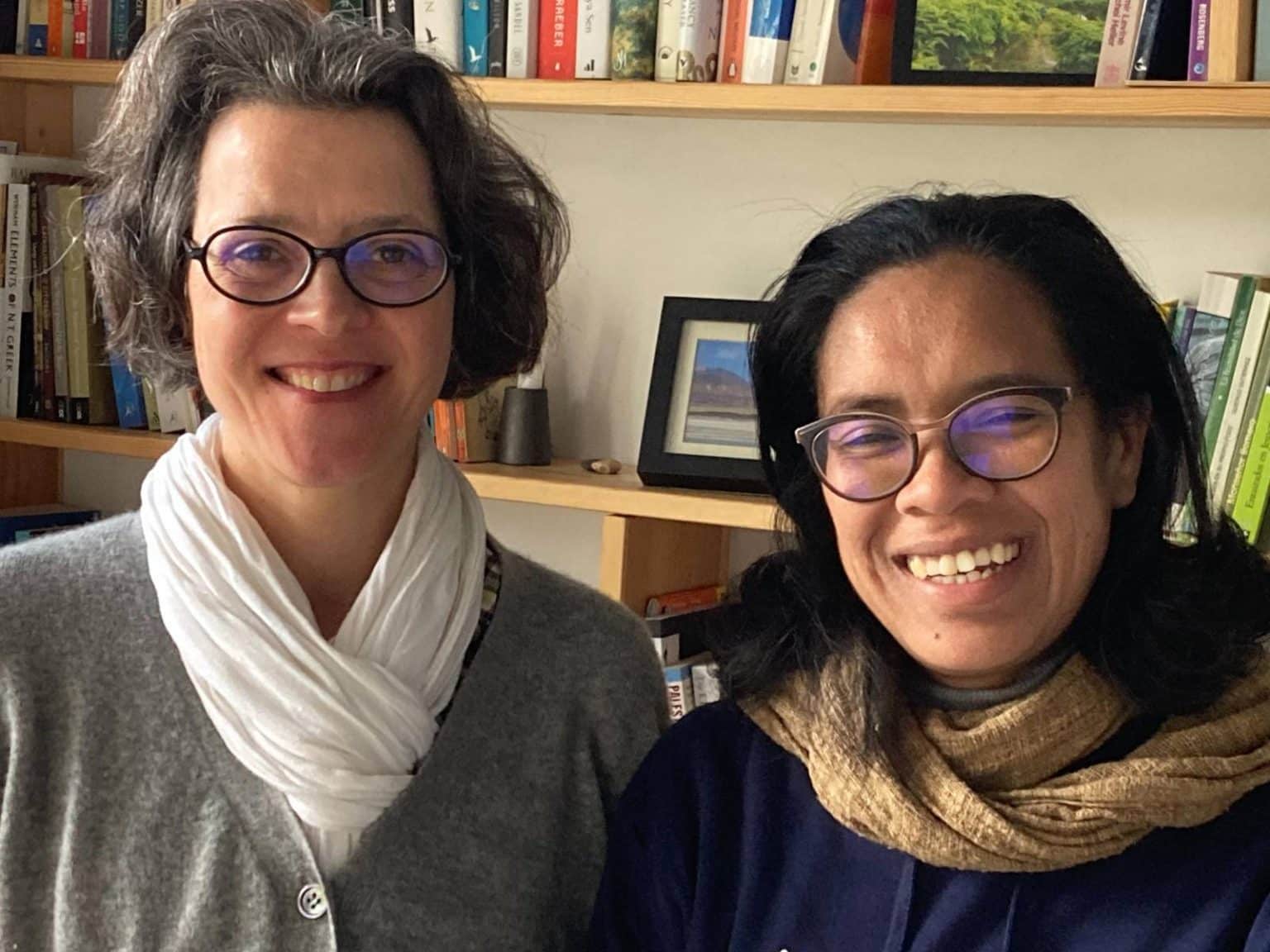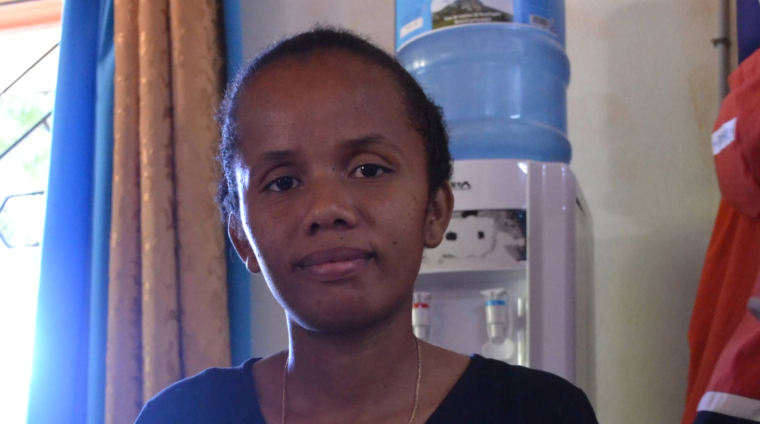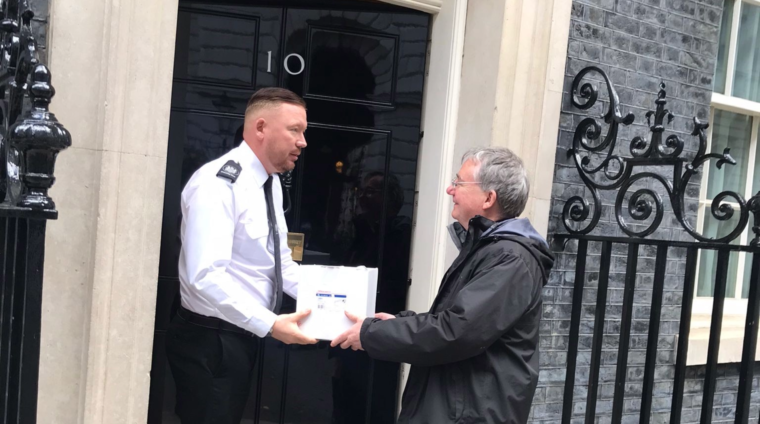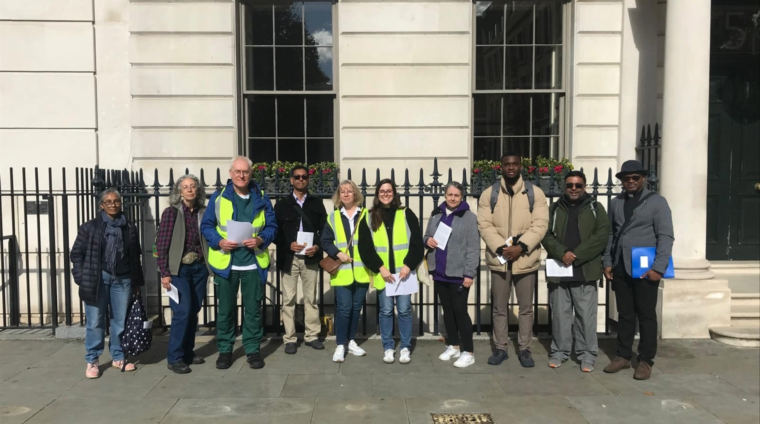Ketakandriana ‘Ke’ Rafitoson, executive director of Transparency International in Madagascar speaks to Séverine Deneulin, director of international development at the Laudato Si’ Research Institute, about her work and how Jesuit institutes can help.
Ke, you have been working tirelessly for many years to hold Rio Tinto, and its subsidiary QMM, accountable for its actions in an ilmenite mine in Southern Madagascar. Could you tell us more about the type of work you do?
Transparency International (TI) is an organization which fights against corruption, and promotes integrity, accountability and transparency in all sectors, including the mining sector. Our chapter, TI Madagascar (TI-MG), has been elected as the coordinator of the Publish What You Pay (PWYP) national coalition. PWYP promotes better governance of extractive industries so that these industries benefit local communities. Our work mainly consists of monitoring how companies behave in terms of governance. For example, this involves ensuring whether companies have adequate grievance mechanisms which are suitable for local communities, or monitoring the relationship between the companies and the government. We suspect that, most of the time, there is a collusion between the companies and the government because the government is granting them a license to operate in the country. So, there can be bribes or embezzlement involved in such relationship, and such patterns of corruption can be detrimental to communities. We also monitor the social performance of companies. Which kind of social activities do they support? Do these activities meet the needs of local communities, or do they just tick some boxes? We are also obviously monitoring potential human rights violations.
We do all this in order to improve company performance and the benefits derived from mineral exploitation, not only for the country, but especially for local communities. ‘Putting people first’ is one of the mottos and motivations of such activities. The slogan of PWYP is ’Extracting the Truth’, which means you have to investigate, you have to listen to the complaints of the community, to what is going wrong, but not just listening, also fact-checking and documenting failures in order to identify room for improvement. We send recommendations to government, because the government is first responsible for the wellbeing of local communities, and needs to be held accountable for what it is doing, or not doing. We also send recommendations to companies so that they can improve their mining operations. The QMM/Rio Tinto mine is only one of the companies we are monitoring, but the case is very illustrative of the kind of lack of involvement of the government in environmental and social monitoring in the mining sector in Madagascar, and the lack of adjustment from mining companies to the needs of local communities.
The mining operations started in 2005 and we are now in 2023. People have been complaining for more than 15 years without anyone listening. That is why we have put an emphasis on that case. In association with the Andrew Lees Trust (ALT) based in the UK we have conducted two main perceptions studies. A first study in 2020 was around water pollution. ALT UK commissioned scientific studies about water pollution, but the company strongly denied some of the scientific findings. This is why I would like to show our methodology. We asked people what they felt on a daily basis about the changes in the water. The population said that it has been more than 10 years that the water they have been using for cooking and other daily needs has changed in colour, smell, and taste. They also sensed that this water was bringing a lot of diseases; their skins were itching, they had stomach aches and reported other, more unusual symptoms of disease. They did suspect that all this was linked to water pollution. We wanted to carry out such study about people’s feelings to complement the scientific study of water contamination, to put more pressure on the company to recognize its responsibility.
In 2022, we conducted a second survey to dig deeper in the deprivations that local communities were experiencing, and their feelings about the mine. We discovered that 94% of people surveyed were dissatisfied with the mine. First of all, they were reporting huge losses of revenues. They said that they lost between 45-50% of their revenues since the mine was established. This revenue loss has been linked to lack of access to natural resources because the forest has been fenced and they did no longer had access to it. Before the mine arrived, they were making a living out of the forest, such as basket-making. There is also a depletion of fish in the water. They said that 27 fish species have disappeared since mining operations began, and that they could only fish 4 species now, which is getting more and more scarce. People also complained about access to jobs. They had promised employment, but this had not materialised as they lacked the relevant qualifications to work in the mine. The company imported staff and human resources from elsewhere. I blame this on the government, as when you have such a big company which is going to settle in the country you have to plan ahead, and think about how to train the local population so that they later can have a job.
So, this dissatisfaction drives the local community to ask for compensation, a huge part of which is related to land loss. The local population lost their land to mining operations without any fair compensation. And this takes us back to the government’s responsibility because it is the government who is in charge of plotting the land and estimating the land value. Estimation at that time was 1 m2 was 300 Ariary (the local currency), equivalent to 6 pence per m2 (1GBP=5000 Ariary). This is nothing. So, people will have 1000 m2, other less, but at the end of the day, they received very little compensation, and some did not get any. This was a big topic of grievance. There were a lot of riots last year because of fish death in the waters around the mine. The population was scared because of the dead fish in the water, and they wanted to know the reason. The reason is still being disputed between the company and independent scientists who are trying to analyse the water pollution. Is the fish death linked to a combination of elevated aluminium and low pH from the mining basin waters, as has been suggested to be the most probable cause, or another factor?
This adds on to the other compensations which the villagers, especially fisherfolks, have been asking for at least ten years. So, there were lots of riots, blockades, demonstrations. Some people were arbitrarily jailed. Freedom of expression is not granted in Madagascar. If you blow the whistle against something, you are likely to be heard by the police or jailed for some time, or threatened. All this makes for an explosive situation. This led eventually to an agreement between the company, the government and representatives of local communities. The negotiation started in May 2022 but it was difficult. The company asked the local communities to file up their grievances, but many are illiterate. How can they write their grievances and estimate the value of their losses if they are not able to write? They were in need of legal assistance. The company offered some legal assistance, but because of lack of trust, the communities didn’t want the assistance of anyone paid by the company because they suspected collusion. More than 8,000 people submitted a compensation claim. The company has currently paid 5,400 compensations but many did not submit a claim. And those who submitted a claim are not happy either, as what they signed was a one-time compensation. Once they had agreed to claim and receive compensation, they are not entitled to claim anymore ever. One sees here the power asymmetries at play in this story: illiterate communities who claim for their rights, facing a careless giant mining company backed by the government. Those communities do not have any assistance except through some civil society organisations like ours who take advocacy at another level so that the company behaves better, and so as to put pressure on the government so that it plays its role correctly.
This is why I came to London to attend the Rio Tinto AGM. I cannot pretend to represent the local communities, but my intention is to make known at the international level what is going at the local level, and to improve mining operations so they are less detrimental to local communities. The company is going to relocate soon in two other places in Madagascar (Sainte-Luce and Petriky), and we do not want it to replicate the same mistakes. We want it to behave better, to listen to communities, and we want to expose the collusion between the company and the government. For example, the National Office for the Environment which is in charge of monitoring social and environmental standards is partly paid by the company itself, so how can it be independent? Moreover, we do not have access to the Office’s monitoring report. We, as civil society, have the right to monitor all of this on behalf of the community. So, there is a lot of parameters to adjust before the company moves to new locations. What we asked at the AGM was mainly to conduct an independent audit of the grievance and compensation process. There are many failures. If one does not deal correctly with these failures and grievances, it will create more explosion and tension. This can threaten a country’s social stability.
To sum up, what we do at TI-MG and PWYP MG is action-research. We document, we do fact-checking, we commission research with quantitative and qualitative data to inform the cause. We complement this with investigative journalism. We do a lot of advocacy work not only at the local and national level but also at the international level. For example, it is the London Mining Network which brought me here in London. This networking and collaboration among different entities is very important. Finally, we constantly seek to mobilize citizens. We are providing information to the public. The situation with QMM/Rio Tinto is happening in one part of the country, and we want other citizens to be aware of it. Justice has to be sought for by Malagasy for Malagasy people. We build people power through information.

How does your Catholic faith inform the work you do? Which role do you see for spirituality and faith communities in promoting justice in mining?
I have to say that the organizations I am working for are non-partisan and not religious, but it is me, as an individual, who is driven by my own faith in what I am doing. It is about faith doing justice. This is something I have learned and have experienced through my volunteer work with the social centre Arrupe in Madagascar, and my long-time involvement with the Jesuits. I have studied in a Jesuit high school and then at the Catholic university of Madagascar. I am Catholic myself. I am convinced that we have been sent here on the earth with a purpose. I am not sure if I can call it my mission or purpose, but I have the feeling that I have to speak for the voiceless and do my best to contribute to their wellbeing, through engagement against corruption which undermines all human rights. I think that each Christian has to get involved in a cause of his or her choice in order to put into practice the apostolate of the laity, because we have to make a difference in our societies, in our communities.
We have to fight injustice and to make sure that each and every individual right is truly guaranteed, protected and valued. So, among my engagement with the Jesuits for instance, I am working a lot with them, spreading the word about good governance, why it matters, explaining during lectures, seminars or other events they organize how citizens, especially Christians, have to be involved in the fight for good governance. It is very simple for me. Whenever you go to Mass on Sunday or any other day, listen to the Scriptures, there is a message for you. The question is how you put that message into practice in your daily life. It is not just about praying. Praying is not enough. It has to be followed by actions. So, the idea is to do something on a daily basis, and in a sustained way, in a long- term work, to make a difference in our societies.
The Global Ignatian Advocacy Network is currently working on a global campaign on ‘justice in mining’. What is your view on what Jesuit networks and institutions could do for the promotion of justice in mining?
I think that the Global Ignatian Advocacy Network, as a network, can join the dots between different countries living under similar realities, in fighting for just mining, so that they can launch a global campaign, including, ideally for me, the establishment of mining observatories in such countries. Once again, it is first about documenting what is wrong. What are the wrongdoings and malpractices which can be found in such mining companies, sites and countries? Then it is about building together this global advocacy with a well-informed network, because if you do not have the data and the findings, some people will say that your struggle for justice is not credible. So, research, observations, findings, all of this together, can make the fight for just mining more credible.
The network can also build regional and global strategies on how to fight together for just mining. This togetherness matters. If you are in a country like Madagascar, you can be quite isolated, because it is an island in the middle of nowhere. No one knows about what is happening there. It is hard to reach out to the continent, because we are part of Africa but geographically outside of it. So, I think that the GIAN could ease things. It could connect different missions and different communities for exchange of good practices and for joint work. Having someone who works with you is very valuable, someone sustaining your fight, because it is a fight in which sometimes one feels desperate if you do not have allies.
And the most important thing for me is that the Network would be able to increase the pressure at the international level. This is one thing that is critically needed. For instance, in a very practical way, Qit Mineral Madagascar (QMM) is not always listening to what we are saying. This is why we had to reach out to the main company, Rio Tinto, so that they could put pressure on their subsidiary. If we had more and more networks at the international level, there would no need for me to travel to London. The Network could act on behalf of all those local fights. So, it would save money, time and energy. It would be more efficient. The Network is guided by the same principles of faith doing justice, the common good, a sense of community service, speaking for the voiceless, working for the most vulnerable people, then we will have a common ground for action. Even if our organisations are not religious (such as TI and PWYP), we can contribute to it. For example, PWYP has published its recommendations for a common African vision on transition minerals during the Alternative Mining Indaba in Cape Town in February, emphasising the need to centre people and planet, to strengthen governance and anticorruption, and to ensure a globally equitable transition. I think you do not need to be religious to share those values. So, there is a complementarity between non-religious organisations and religious ones, which need to be in such Network, because at the end of the day, we all have the same purpose, of protecting communities, making mining work. I have to specify that our work is not anti-mining. TI-MG and PWYP MG do not want these companies to leave because the country needs these mining operations to access certain forms of development, but we want them to do things in the right way, and that is what we are striving for. It is not mining at all costs. There must be also the development of local communities.
Given your advocacy work, what would say is the contribution from academic research institutes, like the Laudato Si’ Research Institute, in promoting justice in mining and supporting the work of social activists like yours?
I think that the collaboration between academic research institutes such as the LSRI and activists, but also civil society organisations, is crucial. Because most of the time, activists and civil society organisations are seen as troublemakers, shouting out slogans, organising sit-ins, demonstrations or whatever. But if you don’t have good research, serious findings to sustain your fight, then your cause will not be credible. Some organisations have the ability to do this research, like we do at TI, thanks to some collaboration with other organisations and small grants, but it is not the case for all organizations or grassroots communities. So, this collaboration really helps them to build this capacity for collecting information on what is happening on the ground. The reverse is also I think relevant because research institutes can take interesting information from the ground, e.g., a socio-economic study, an anthropology study, you can have some material to analyse what these communities are going through. It is a win-win collaboration in my view, mutually enriching for this search for justice at the global level. It is really something I would push for.
And the thing to do also is to build research skills and capacities at the local level. For instance, if the LSRI could organize a training for local researchers, this would be good. How to do research for greater justice in mining in the light of the social teachings of the Catholic Church? How to drive these teachings and principles into action with a research lens? Something like this could be very interesting and useful. Because we are all moved by the teachings of Pope Francis in Laudato Si’. The notion of integral ecology is spoken about more and more. But not everybody sees what integral ecology implies for our daily lives. How to translate integral ecology into action? The narrative today is framed around a discourse of energy transition, fighting climate change, alleviating the impacts of climate change. But we have mostly forgotten about the implications of this energy transition. We talk about energy transitions but I wonder if there will be ever justice for the South. For small countries like Madagascar, rich in minerals but with a poor governance framework and not much anticorruption safeguards, won’t we be ruined by energy transitions? If something is not done, if there is no timely global reflection on the topic, then the energy transition will be harmful. The LSRI could do for example work in that regard, in fostering that global reflection, building a narrative around what communities already affected by mining are living, and putting warnings and safeguards. Yes, of course humanity needs to fight climate change and find more sustainable ways of living, but there are also human rights and social considerations that we have to keep in mind. That’s the spirit of action-research for me. Research followed by action, and all of this informed by the stories of human beings.





